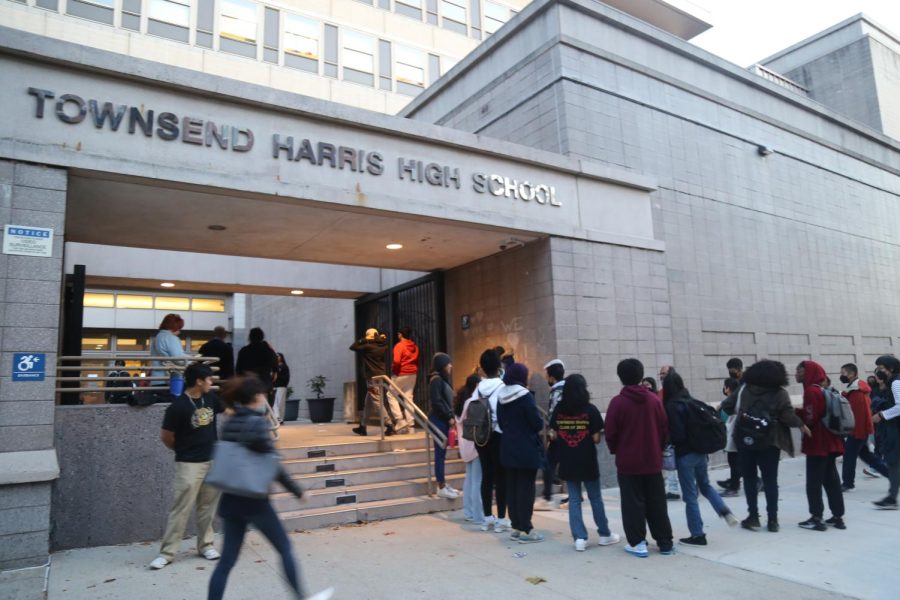A year after Roe v. Wade was overturned, few Harrisites aware of program making condoms, sexual health resources available to students

Ali Hamja, a junior at Townsend Harris High School, was first introduced to the Condom Availability Program (CAP) when asked if he knew what it was. Ali stated, “I’ve never heard or seen this acronym or program name before in this school. I didn’t even know we had a program that served a purpose like this.”
Ali’s understanding of CAP is typical of THHS students. While the Department of Education (DOE) requires CAP to be offered citywide as part of its HIV/AID prevention program, most Harrisites seem unaware that it even exists. In March, The Classic distributed a survey to 161 students across all four grades, asking them to circle yes or no in response to the question, “Do you know what the Condom Availability Program (CAP) at Townsend Harris is?” Of the 31 freshmen, 55 sophomores, 49 juniors, and 26 seniors polled, the majority of each class had no knowledge of CAP: 68% of freshmen, 78% of sophomores, 75% of juniors, and 58% of seniors. This apparent lack of knowledge about this ‘required’ program suggests that much of the school is unaware of the program or their access to free condoms and information.
Today marks a year since the Supreme Court stunned the nation by overturning Roe v. Wade in the landmark Dobbs v. Jackson Women’s Health Organization decision. In the intervening time, numerous commentators have said that absent the Roe v. Wade standard, comprehensive sex education is more important than ever in schools. Earlier this year, The Classic reported on the state of health classes at THHS. This piece explores the availability of condoms and information about sexual health at THHS (and the awareness of the student body about that availability).
“I think of it as a function of safety,” says Ian Morzan, THHS dean and history teacher. “It’s important for students to have an understanding and awareness of the CAP program in order to be able to protect themselves should they choose to engage in sexual activity.”
CAP is meant to provide students with “free condoms, medically accurate health information, and health referrals from trained school staff,” according to the DOE. The training to become certified for CAP takes place annually at THHS, and CAP-certified PE teacher Gabriela Pedreros explained that the training takes place over the course of three sessions, with each session lasting for about three hours. Matthew Lemanczyk, also a CAP-certified PE teacher, said that through this special training, the faculty are taught the importance and value of the program.
Condom distribution is a part of HIV/AIDS education, which has been mandated since 1987 by the New York State Education Department. In the 2022-23 school year, THHS interpreted this requirement by separating the program into two components, both taking place on December 1st, World AIDS Day. The first component consisted of lessons taught in students’ History and English classes led by peer educators, who Assistant Principal Ellen Fee described as “fellow students that have been trained… to deliver lessons about HIV/AIDS.”
The second was an assembly with guest speaker Julia Peitzer, the assistant director of Generation Q, an LGBTQ+ youth center that offers a safe and friendly environment with a wide variety of recreational opportunities, as well as emotional support. The 45-minute event, however, was not available to all classes. Senior Max Silver recalled, “I was disappointed that my class was not invited to the HIV/AIDS day assembly, which was especially weird because the assembly was during my health class, and I thought it would make sense for us to go then.” Senior David Ghobryal, who attended the assembly, recalled, “I felt like the lecture had very little to do with the details of HIV/AIDS. It had little information on how HIV/AIDS spreads, or how it can be prevented or treated. I wish we were directed more towards these topics rather than given the history of HIV/AIDS and the LGBTQ+ community.”
HIV/AIDS Day at THHS is the designated time to discuss awareness for condoms and related resources per the requirement under HIV/AIDS education and New York State Codes, Rules, and Regulations, but not every student benefits from this plan. Senior Jaiden Del Rosario, for instance, was not invited to the HIV/AIDS day assembly, and no HIV/AIDS peer educators were present in any of her classes on that day. And as she is currently taking health this second semester of senior year, she told The Classic that she was not informed of the CAP program until recently. Students like Jaiden have gone through almost their entire time at THHS with no knowledge of crucial resources like CAP, because they are not given access to the HIV/AIDS Day lecture or to peer educators.
Towards the end of March, THHS put up a poster on the bulletin board outside of the guidance suite on the third floor with a QR code under the label “CONDOM AVAILABILITY.” The document accessible from this code summarizes CAP, saying that “The information that students get through CAP helps them learn how to live a healthy life, communicate with others and avoid risky behavior.” There is also a list of all of the CAP-certified staff members: Raymond Adamkiewicz (PE teacher), Jamal Bermudez (PE teacher), Chris Hackney (History teacher), Arlene Laverde (Librarian), Mr. Lemanczyk (PE teacher), Sarah Loew (Science Teacher), Gabriela Pedreros (PE teacher), Jeremy Wang (Guidance Counselor), and Sara Skoda (Guidance Counselor).
While conducting research for this article, the course of action to simply find someone who can offer CAP-related resources was troubling, especially if one doesn’t notice the QR code on a bulletin board. Prior to the CAP information being posted there, we visited adults we believed would be part of the program. We were turned away twice before finding a person with information: guidance counselor Jessica Graf. Upon finding her, Ms. Graf explained that she was not a part of CAP this school year, but she was able to provide us with the list of CAP-certified staff. This offered us an insight into the possible journey a student in search of condoms may follow. For students, potentially shameful or embarrassed about reaching out for these resources, the prolonged process would be discouraging and could cause them to be wary of accessing these crucial resources.
Additionally, providing a health resources room is a requirement under the NYC DOE HIV/AIDS Prevention Program, which instructs high schools to have a designated room for CAP resources and to act as a “safe, supportive, inclusive place for all students.” However, we spoke to three of the adults listed as CAP advisers about the existence of such a room. The advisers said that there’s not necessarily a room for resources; instead, the certified adults just carry their own resources for distribution.
Ms. Graf, however, said that Room 312, the guidance suite at THHS, was the official health resources room.
The CAP program is most prominently seen as part of the HIV/AIDS prevention education rather than as part of reproductive health and is taught as a supplement during some (but not all) health classes. Even though the program is supposed to provide condoms and related information about sexual health and safety, students are often left to their own devices at THHS. There are efforts being made to increase the level of awareness and availability of CAP in THHS, such as the bulletin board poster with directions to further information. But even if the majority of THHS knew about it, CAP itself is very limited in what it offers, and there would still be gaps in true reproductive health services available to students here.
When The Classic asked Mr. Bermudez if he thought enough students are aware of CAP, he said he couldn’t give a definitive answer. “I’m not sure if students that I don’t teach are being told about the program to the extent that I inform my students about it,” he said. Mr. Bermudez added that, “there should be a level of privacy but not secrecy about CAP and sexual health.” It is clear that since THHS students do not take a health class until their senior year, and since information about CAP seems to be unclear, underclassmen are deprived of critical information about sexual health.
Other New York City high schools offer more comprehensive programs, such as the Connecting Adolescents to Comprehensive Healthcare (CATCH) program at schools like Stuyvesant High School and Bronx Science High School. CATCH offers a wide variety of resources, from primary health care services to family planning services including contraception and pregnancy tests. The depth of inclusivity of the CATCH program brings into question the effectiveness of CAP – not only that so few people have heard of it, but that it fails to provide true reproductive health services to the student body.
Your donation will support the student journalists of The Classic. Your contribution will allow us to purchase equipment, support our extracurricular events, celebrate our staff, print the paper periodically, and cover our annual website hosting costs.
































